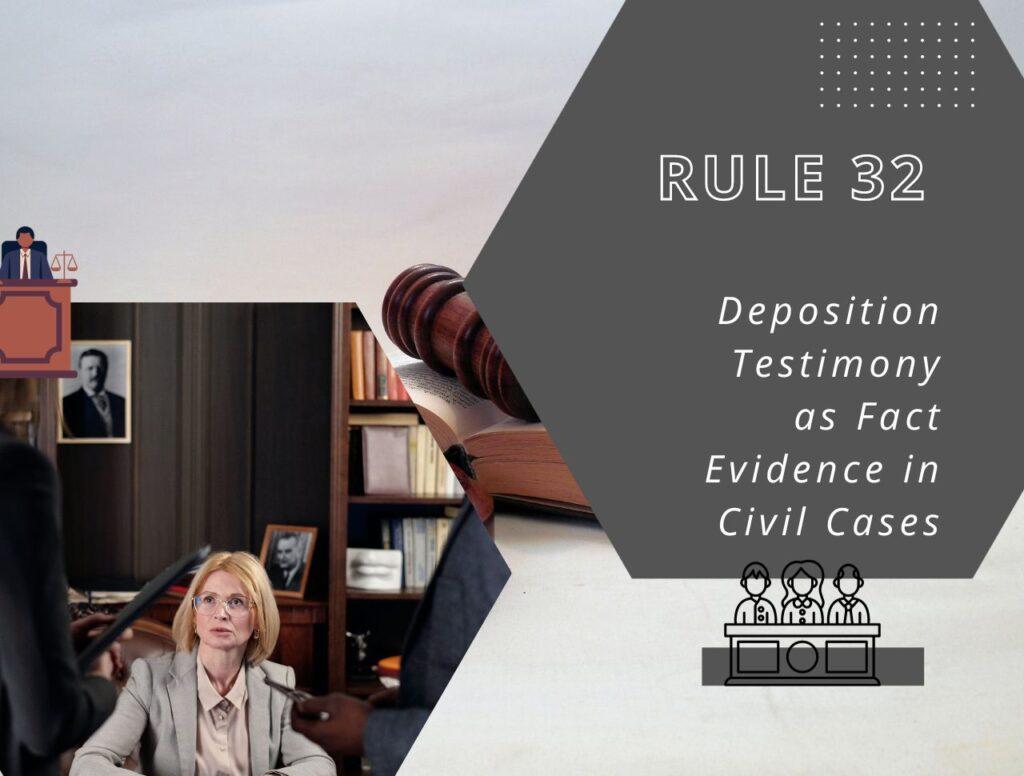Rule 32 of the Federal Rules of Civil Procedure regulates how depositions can be used as evidence in court. It defines the circumstances, exceptions, and scenarios in which depositions can be used against a party or for any purpose, no matter if the witness can or cannot testify at trial.
This rule is important because depositions are one of the most important sources of evidence in civil litigation, as they allow lawyers to obtain and preserve the testimony of witnesses who have personal knowledge or expertise about the facts and issues of the case.
However, not all witnesses are available or willing to testify in court, and some witnesses may change or contradict their statements over time. Therefore, lawyers need to know how to use depositions as evidence in court under certain circumstances. This essay will explain how to present deposition testimony as fact evidence in civil cases under Rule 32, by discussing the following points:
- The general requirements for using depositions as evidence under Rule 32
- The exceptions to the general rule that depositions can only be used against a party who was present or represented at the deposition
- The situations in which depositions can be used for any purpose, regardless of whether the witness is available or unavailable to testify at trial
Explain the general requirements for using depositions as evidence under Rule 32
The first step to present deposition testimony as fact evidence in civil cases under Rule 32 is to ensure that the deposition meets the general requirements for admissibility.
According to Rule 32(a)(1), a deposition can be used as evidence only if it was taken under the Federal Rules of Civil Procedure or a court order. This means that the deposition must follow the rules and procedures for taking, serving, filing, and using depositions, such as giving proper notice, asking relevant questions, making objections, and producing exhibits.
The deposition must be relevant, reliable, and not hearsay.
Relevance means that the deposition must tend to make a fact more or less probable than it would be without the evidence.
Reliability means that the deposition must be trustworthy and accurate, based on the witness’s personal knowledge, perception, memory, and veracity.
Hearsay means that the deposition must not be an out-of-court statement offered to prove the truth of the matter asserted.
The Deposition
Finally, the deposition must be authenticated by the witness or another person with personal knowledge. Authentication means that the deposition must be shown to be what it claims to be, such as by identifying the witness’s voice or signature.
What are the exceptions to using depositions only against present or represented parties?
The second step to present deposition testimony as fact evidence in civil cases under Rule 32 is to determine whether the deposition can be used against a party who was not present or represented at the deposition.
According to Rule 32(a)(2), a deposition can only be used against a party who was present or represented at the deposition, unless an exception applies. There are three main exceptions to this general rule:
The first exception is that the deposition can be used against any party who had notice and an opportunity to participate in the deposition. Notice means that the party was informed of the time and place of the deposition and had a chance to attend or object. Opportunity means that the party was able to cross-examine the witness or offer contrary evidence.
The second exception is that the deposition can be used against any party who agreed to the use of the deposition or waived their objections. Agreement means that the party consented to the use of the deposition either expressly or impliedly. Waiver means that the party forfeited their right to object to the use of the deposition by failing to raise a timely or specific objection.
The third exception is that the deposition can be used against any party who falls within one of the categories listed in Rule 32(a)(2), such as successors in interest, adverse parties, or persons with a similar interest.
Successors in interest means that the party inherited or acquired the rights or liabilities of another party who was present or represented at the deposition.
Adverse parties means that the party has an opposing interest to the party who offered the deposition.
Persons with a similar interest means that the party has a common interest with another party who was present or represented at the deposition, such as co-plaintiffs, co-defendants, or co-conspirators.
When can depositions be used for any purpose, regardless of witness availability?
Identifying the situations in which depositions can be used for any purpose, regardless of the witness’s availability or unavailability to testify at trial, is the third step to present deposition testimony as fact evidence in civil cases under Rule 32.
According to Rule 32(a)(4), a deposition can be used for any purpose if the witness is unavailable to testify at trial unless the absence was procured by the party who seeks to use the deposition.
Unavailability means that the witness cannot be present or testify at trial because of death, illness, infirmity, imprisonment, absence, or exemption by court order or rule.
However, even if the witness is available to testify at trial, there are three situations in which depositions can be used for any purpose:
- If the witness testifies inconsistently with their prior deposition or statement, the deposition can be used for any purpose in the first situation. Inconsistency means that the witness’s testimony contradicts or differs from their previous deposition or statement in a material way.
- The second situation is that the deposition can be used for any purpose if the witness is an expert an adverse party or a person designated by an adverse party to testify on their behalf. Expert means that the witness has specialized knowledge, skill, experience, training, or education that can help the trier of fact understand the evidence or determine a fact in issue. Adverse party means that the witness is a party to the action or a person who controls or represents a party to the action. A designated person means that the witness is a person who was identified by an adverse party as one who will testify about a particular subject matter on their behalf.
- The third situation is that the deposition can be used for any purpose if it is admitted by stipulation. Stipulation means that the parties agree in writing or on the record to admit the deposition as evidence.
By following these steps and guidelines, lawyers can effectively use depositions as evidence to prove facts in civil cases under Rule 32. It can help them achieve their goals and protect their client’s interests in court. However, lawyers should also be aware of the potential challenges and limitations of using depositions as evidence, such as objections, motions, sanctions, and ethical issues. Therefore, lawyers should always exercise caution and professionalism when taking and using depositions in civil litigation.
References
: Federal Rules of Civil Procedure, Rule 30.
: Federal Rules of Evidence, Rule 401.
: Federal Rules of Evidence, Rule 602.
: Federal Rules of Evidence, Rule 801.
: Federal Rules of Evidence, Rule 901.
: Federal Rules of Civil Procedure, Rule 30(b)(1).
: Federal Rules of Civil Procedure, Rule 29.
: Federal Rules of Civil Procedure, Rule 32(d).
: Federal Rules of Civil Procedure, Rule 25.
: Black’s Law Dictionary (11th ed. 2019), s.v. “adverse party.”
: Black’s Law Dictionary (11th ed. 2019), s.v. “similar interest.”
: Federal Rules of Civil Procedure, Rule 32(a)(4).
Also, Read: Martial Law: History, Types, and Consequences of Military Rule
Note: The article is based on content generated by AI models like Copilot and Chatgpt.






